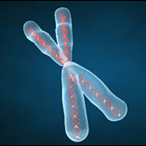Hereditary Condition Causing Limb Weakness Traced to Gene for Rare Disorder
A gene that causes a fatal childhood brain disorder can also cause adults to develop peripheral neuropathy, a condition resulting in weakness and decreased sensation in the hands and limbs, according to a study by researchers at the National Institutes of Health and other institutions. The study is the first to show that different mutations in the same gene cause the two seemingly unrelated disorders.


 BACK TO TOP
BACK TO TOP